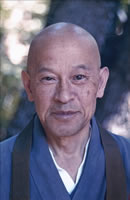David Chadwick: Hard to say. It's just got a unique chemistry that has worked in many ways for many people. ZMBM can be a warm, inviting introduction to practice or a timeless reference for an old hand. It wasn't written for a general audience though it's worked that way. It was spoken to a small group of housewives and students who returned Thursdays to sit with and listen to Suzuki's brief lecture before drinking tea and laughing together. That intimacy and friendliness is communicated in those pages. Suzuki's teachings connect with a light poetic touch.
S: You began studying with Suzuki Roshi in the 1960s. Do you have a memory of your first impression of him?
DC: He didn't put on any airs, didn't put himself above others, but right away I got a sense of his spiritual authority. He conveyed that I could know what he knew. His posture and presence were evidence that he had cultivated himself in a way that took great perseverance and patience. Nothing to get excited about, nothing special, just normalcy at its best.
S: You became your teacher's biographer (Crooked Cucumber: The Life and Zen Teaching of Shunryu Suzuki), traveling to Japan to research his life before his move to America. Were there any surprises?
DC: Sure. I came to realize how much he'd suffered, got closer to his shadow and demons, his extreme absentmindedness, the resentment and sadness of his children for what a distant father he had been, yet their pride at what he'd made of himself, of what he'd done. Then others who'd been with him before, during, and after the war spoke with admiration and gratitude for the sanity and light he had subtly shined in his corner of the world. My eyes were further opened upon learning more of the murder of his wife, the suicide of his younger daughter, and discovering an early marriage tragically annulled due to illness. I realized how unfulfilled he felt there and unsatisfied also with himself. He indeed was reborn when he landed in America.
DC: He taught by example of course. He followed the schedule like an eager student. He taught with words by giving lectures and speaking with people, but he preferred to teach by sitting and working with others in silence. He taught through making people feel accepted and understood but when he could see they were on the path, he'd start rejecting-knocking away their assumptions, attachments. He had no formula. He said "be yourself" but what made it work was that he was himself.
S: In what ways do you see his teaching "trickling down" into our own day?
DC: Suzuki made a great effort minute after minute and that's what I see in countless people who pass through his zendos and read some of what he said. We're encouraged to keep making an effort to wake up. We believe it's possible. Each has their own way. Each is also encouraging others. And in the middle of this effort is his playful spirit saying "don't be too serious."
****
Most of this I can hear myself saying but a few lines I wonder if an editor put in. Like "ZMBM can be a warm, inviting introduction to practice or a timeless reference for an old hand." I wouldn't have said "written." I think of it as spoken, transcribed, and edited. But maybe I said it. I wonder a little about "It wasn't written for a general audience though it's worked that way." Some lines are really good and I'm happy to take credit for like "He said 'be yourself' but what made it work was that he was himself." Did I really say that? If so, good for me. My impression reading it is, Oh that's good. I never thought of that but I'll use it now. Same with "normalcy at its best." That's good. I think it's a questionnaire Shambhala sent me that I filled out. It's easier to believe I wrote that stuff but still a little bit of a stretch. I don't know about some other stuff either but I forget a lot these days and it's good. I'll sign it. - DC
